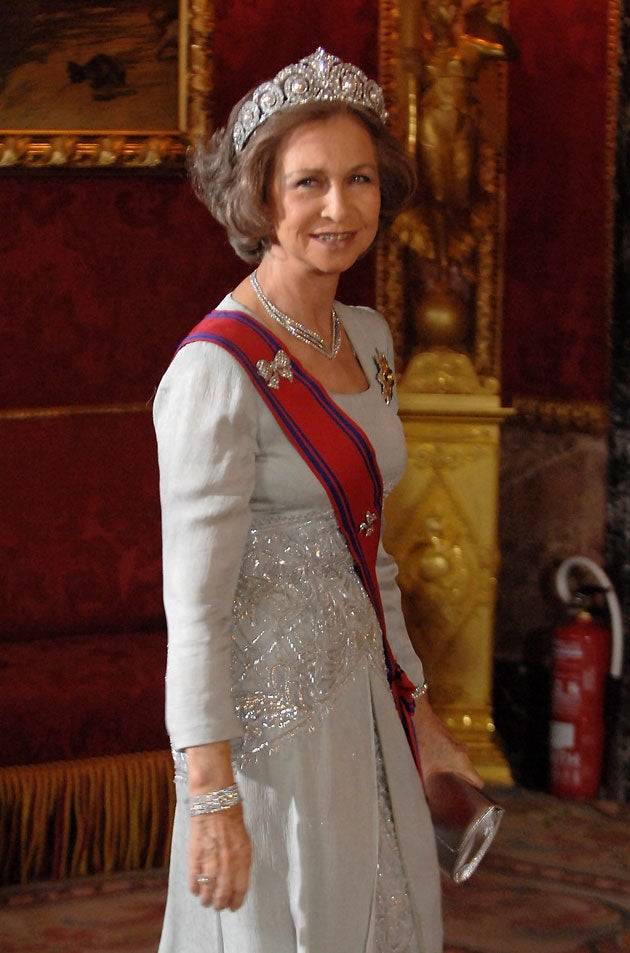Ryanair drops royal ad campaign
Faster than it turns around its flights, the low-cost airline pulls promotion featuring Queen Sofia of Spain after a threat of legal action

Your support helps us to tell the story
From reproductive rights to climate change to Big Tech, The Independent is on the ground when the story is developing. Whether it's investigating the financials of Elon Musk's pro-Trump PAC or producing our latest documentary, 'The A Word', which shines a light on the American women fighting for reproductive rights, we know how important it is to parse out the facts from the messaging.
At such a critical moment in US history, we need reporters on the ground. Your donation allows us to keep sending journalists to speak to both sides of the story.
The Independent is trusted by Americans across the entire political spectrum. And unlike many other quality news outlets, we choose not to lock Americans out of our reporting and analysis with paywalls. We believe quality journalism should be available to everyone, paid for by those who can afford it.
Your support makes all the difference.Ryanair, the low-cost, "people's" airline, has had to tug its corporate forelock to the Queen of Spain after featuring her in one of its cheeky celebrity exploitation ads that seem to specialise in upsetting VIPs.
Queen Sofia may fly bucket-shop, but when it comes to having her name and image misused, she can become awfully haughty. Days after Her Majesty's £13 flight to London to visit her sick brother, Ryanair sought to exploit her high profile. The airline launched a brash advertising campaign in which the elegantly coiffed, smiling Queen Sofia appeared over the slogan "Fly like a monarch". The half-page advert published in the Spanish press last week included a quote torn from a popular freesheet: "Queen Sofia flies low cost".
It also gushed: "It is a privilege for us that Queen Sofia flies with the airline with the highest growth in Spain." And in a starburst hovering beside the royal cheek, it promised that Ryanair would donate €5,000 (£4,400) to a charity of the Queen's choice as a gesture of gratitude.
The royal palace of Zarzuela was furious. "We are annoyed and surprised. Nobody approached us to request permission or talk about the matter. They are making improper use of the Queen's image," a palace spokesman said on Friday. "We are not going to get involved with this advert or any donation coming from the improper use of the image of Doña Sofia." The palace was looking into legal action, the spokesman added.
Before the day was out, Ryanair backtracked with a roar of retro-engines, and pulled the campaign. "We apologise if this caused Queen Sofia any offence... We simply wanted to thank the queen for travelling with us. We didn't highlight it; we simply thanked her," a spokesman said.
The circumstances of the flight could not have been further removed from royal protocol. Last weekend, Queen Sofia, 70, accompanied her husband King Juan Carlos to celebrate Armed Forces Day in the northern town of Santander. She then flew directly to Stansted to be at the bedside of her brother Constantine, the exiled former king of Greece, who is recovering from heart surgery in London. King Juan Carlos returned to Madrid in the official plane. When the news emerged, palace sources stressed the airline was chosen not because it was cheap, but because it offered "the only possible" direct flight to London. Queen Sofia usually uses the national carrier Iberia for private trips.
It is not the first time Ryanair has roped in prominent figures to promote itself, trampling on sensitivities in the process. In February last year, it had to pay €60,000 compensation to the French President, Nicolas Sarkozy, and his wife, Carla Bruni, for unauthorised use of their image. Mr Sarkozy sued for a symbolic €1 in damages, which the court granted. Ms Bruni wanted €500,000, but the court awarded her the smaller sum.
The Spanish Prime Minister, Jose Luis Rodrigo Zapatero, featured in September 2007. In that ad Mr Zapatero mused whether Ryanair's offer of two million free flights was a better deal than his government's policy of giving €2,500 to every newborn baby. The ad was withdrawn after complaints, but not before the airline considered it had achieved "sufficient coverage".
However, Ryanair denies it is courting notoriety by its recurrent use of unauthorised photographs. "The airline simply comments on items which are topical, timely and newsworthy," a spokesman said.
Join our commenting forum
Join thought-provoking conversations, follow other Independent readers and see their replies
Comments